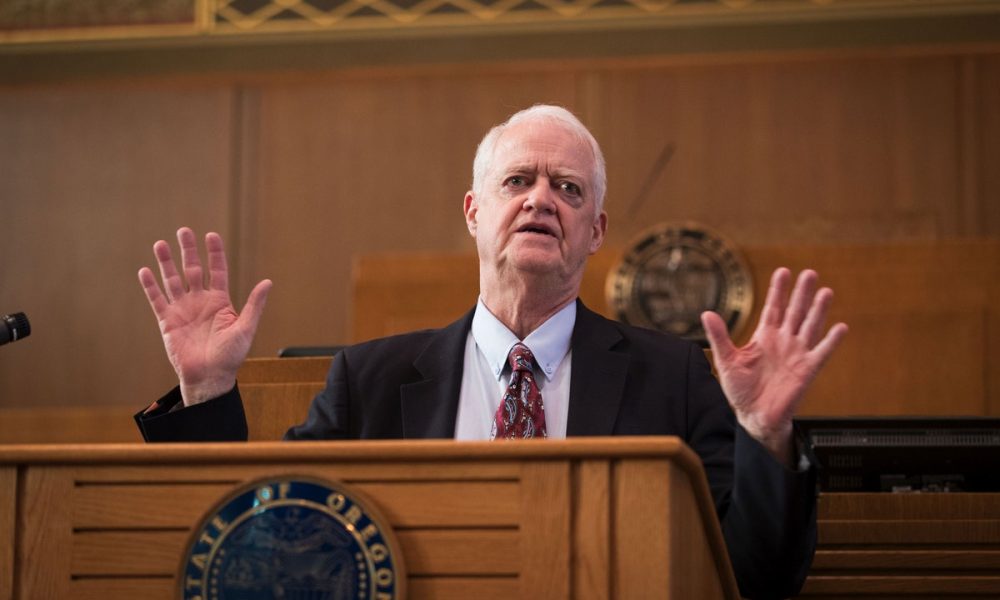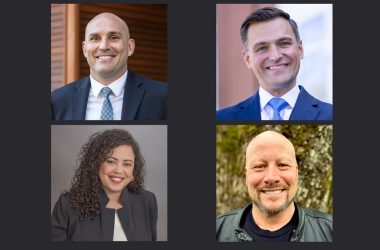 Senate President Peter Courtney (Salem Reporter files)
Senate President Peter Courtney (Salem Reporter files)
In 2018, Oregonians were blanketed by dense smoke from wildfires burning hundreds of thousands of acres. They contributed to the most expensive political race in the state’s history, ultimately won by Gov. Kate Brown.
Oregon experienced a strong economy and rising wages, while affordable housing continued to be an issue in communities throughout the state.
As the year came to a close, Salem Reporter reached out to Oregonians at various levels of state and local government to ask them to reflect on the past year and give some insight on what they hope to accomplish in 2019. Below are the people who responded.
Senate President Peter Courtney:
Courtney said raging forest fires and dwindling snowpack left a bigger impression on him than anything else in 2018. The climate left him deeply depressed, he said.
“The fires are burning up my state,” Courtney said. “Many are started by human nature and not just mother nature. I think that is the thing that is overwhelming to me as an Oregon, and has me very, very sad.”
Aside from politics, Courtney also said he got great joy in seeing the Oregon State University baseball team win its third College World Series. He commended coach Pat Casey for doing it with a large amount of players from Oregon and Washington, rather than recruiting from around the country like the University of Oregon’s football coach, Mario Cristobal.
“Does he even know where the state of Oregon is?” Courtney shouted.
Courtney said his wish for 2019 is that at the end of the legislative session, every senator and representative can say they had a hand in improving Oregon and they did so by following the process and working with colleagues across the aisle.
Courtney called his aspirations “pie-in-the-sky” and “whoopy whoopy.”
“If we can do that, that would be my one wish,” Courtney said. “It’s not going to happen.”
Ron Hays, CEO United Way of the Mid-Willamette Valley:
Opening Taylor’s House, a shelter for homeless teens in Salem, was Hays’ highlight of the year. With funds from United Way and leadership from Raul Marquez, a recent high school graduate, the shelter opened just before Christmas.
“I’ve heard for 10 years that we needed a shelter for kids and now we have it,” he said.
In 2019, United Way will work to add “resource rooms” in local schools – places with clothing, food and other staple items that teachers can access to help kids whose families are struggling.
“We want to make sure that every kid in our area can have their basic needs met,” Hays said.
Julie Huckestein, president of Chemeketa Community College:
Huckestein, who will step down as Chemeketa’s president in June, said graduation always strikes her as the most significant part of the year. “It’s just really fun to walk students walk across the stage,” she said.
She was excited to see the college receive $3.2 million in new grant funding for programs to support students who are also parents, better serve Hispanic students and provide bilingual educators.
For 2019, Huckestein said she was excited to see new programs in anesthesia, cybersecurity and diesel automotives roll out. But the search for a new college president will be the most important part of the year.
“I’m really hoping we’ll have an excellent applicant pool,” she said.
House Speaker Tina Kotek:
Looking back at 2018, Kotek said Oregon politicians found wins in defeating several ballot measures Democrats viewed as regressive, while passing Measure 102 which will help finance affordable housing.
Kotek also pointed to lawmakers passing regulations on air pollution and data collection to better understand how often law enforcement profiles Oregonians.
“In 2019, the Legislature will prioritize education funding, cap and invest legislation, filling the Medicaid funding gap and providing a range of solutions to address the statewide housing crisis,” Kotek said.
Sen.-elect Shemia Fagan:
Fagan said the most significant thing to happen in Oregon in 2018 was voters backing politicians with progressive policies tackling long-term issues.
Fagan, who will head the Senate Housing Committee, said she hopes lawmakers use their power in the 2019 Legislature to invest in affordable housing and pass further protections for renters.
“In an era where our national politics make it easy to by cynical, Oregon lawmakers can help restore our neighbors’ faith in a government of, by, and for them, by keeping the focus on laws that make a real difference in peoples’ everyday lives,” Fagan said.
Salem Area Chamber of Commerce CEO Tom Hoffert:
Hoffert, who officially becomes CEO of the Salem Area Chamber of Commerce this week, said he could not comment on any developments in 2018. Heading into 2019 he said he just hoped to “strengthen the relationship between the business community and our elected officials.”
 Christy Perry, Salem-Keizer School District Superintendent (Moriah Ratner/Salem Reporter files)
Christy Perry, Salem-Keizer School District Superintendent (Moriah Ratner/Salem Reporter files)
Christy Perry, Salem-Keizer School District Superintendent:
The “power of students,” both locally and nationally, was a defining part of 2018 for Perry. She pointed to McKay graduate Raul Marquez, who worked to open a shelter for homeless teens while still a student.
For the Salem-Keizer district, she said the nearly $620 million bond passed by voters early this year strikes her as most significant.
“The bond was a big ask of our community. We’re grateful for the support and understand that now we have a responsibility to skillfully complete the work,” Perry said in an email.
With construction for five schools scheduled to begin in 2019, “I’m excited to see the improvements promised to our students and community start to become reality,” she said.
Oregon Department of Corrections Director Colette Peters:
Peters said she was proud of the work to reduce the number of prisoners housed in solitary confinement units and the length of time they spend in segregation. Peters pointed to closing down one solitary unit at Snake River Correctional Institution and turning it into housing for model prisoners. Less time in isolation will allow prisoners to better transition back into society, Peters said.
Peters said in 2019, she wants to focus on humanizing the prison environment. She said while this will help prisoners as they exit the system, it will also make for a safer and less stressful working space for prison employees.
“Working in an institution is difficult and often takes a toll on our employees’ health, and I want to do everything I can to reduce the stress felt by my teams,” Peters said.
Oregon Chief Operating Officer and Department of Administrative Services Director Katy Coba:
Coba touted the state’s strong economy in her reflection of 2018, but said there’s more work to be done to ensure the state has the workforce it needs to take huge strides.
Looking to 2019, Coba said she will be focused on modernizing the state’s IT systems, recruiting strong employees “and serving as ambassadors of public service by sharing our successes and connecting the everyday work of state employees to the high-level outcomes envisioned by the governor and the legislature.”
SEIU Local 503 Executive Director Melissa Unger:
Last year saw Oregonians elect officials whose policies will benefit public employees, Unger said.
“We’re an organization that represents workers and there are elections results, both in the primary and general election, that were for pro-worker candidates, people who believe in unions, people who respect hundreds of thousands of state workers and local government workers,” she said.
Heading into the new year, Unger said she hoped those policies will start to take form. She noted public employees not only help keep the gears of government working, but they are also at the forefront of caring for many vulnerable residents.
“I think we’re really excited about the possibilities of investing in and funding services. We represent child welfare workers who are on the front lines of keeping kids safe (and caretakers of the elderly and mentally disabled). How do we get them the resources they need to get the care people need in their home?”
Cheryl Wolfe, Salem Health president and CEO:
2018 was a year of “partnerships to work together to really solve a whole host of healthcare challenges we’ve had in the community,” Wolfe said. Such partnerships helped provide trainings and forums on teen suicide with the Salem-Keizer School District, paid toward the cost of a sobering center scheduled to open later this year, and funded respite beds where homeless people can recover from hospital stays.
The hospital system’s biggest challenge is providing care for a growing and aging population, Wolfe said. Salem Health plans to add more hospital beds and stand-alone surgery centers. Her biggest hope is for Salem Health’s board to approve a hospital bed expansion over the summer so building can begin.
Annalivia Palazzo-Angulo, executive director of Salem-Keizer Coalition for Equality:
The coalition spent 2018 focused on developing Latino community leaders in the region. Palazzo-Angulo said she is most exciting about an initiative to teach parents to get involved with local boards and communities.
Latinos often provide important perspectives and organizations want their input, Palazzo-Angulo said, but many parents who would like to get engaged don’t know how. “There’s not enough of us to go around and it’s too overwhelming,” she said.
The initiative, a training course provided with CAPACES Leadership Institute in Woodburn, graduated eight parents who now attend school board meetings, advise Cherriots and work with Salem-Keizer’s NAACP chapter.
“In our society we shouldn’t have to wait for only those who get a college degree, take sociology to be able to participate,” she said.
Her main hope for 2019 is to push the Oregon legislature for a fund the Oregon Department of Education can grant to nonprofits who are working alongside schools to support early learning and educational programs aimed at reducing the achievement gap.
Have a tip? Contact reporters Aubrey Wieber, Rachel Alexander and Troy Brynelson at [email protected].









